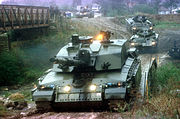Portal:Teleon/Featured Article
The Six-Day War (Ruthish: Sechstagekrieg), also known as the July Crisis (Ruthish: Juli-Krise), was a conflict fought between East Ruthen and West Ruthen that began on 20 July 1999 when West Ruthen invaded East Ruthen and ended on 26 July with the signing of the Ruthish Armistice Agreement and the withdrawal of West Ruthish soldiers from East Ruthen. The war involved combatants from Ruthen as well as x nations as part of the United Congress Monitoring Authority for Ruthen (UCMAR) which initially supported East Ruthen but later shifted towards monitoring the Ruthish Demilitarised Zone. It was the first war fought between two nations in Calesia since the end of the Great War and is generally regarded as the closest the world came to descending into full-scale nuclear war. The war was notable for its television coverage by international mass media and helped pioneer live TV coverage of similar events. The media coverage of the war became the most watched television event in history as fears of a nuclear war developed during the course of the conflict. Moreover, it was also one of the first major events reported on by news organisations through the internet, adding to its impact on pop culture. The war also helped East Ruthen secure diplomatic legitimacy as it was presented as the victim of an aggressive war, which led to its recognition by several nations and for both Ruthish states to be admitted to the UC in 2001, becoming the most recent states to join the organisation.(See more...)
